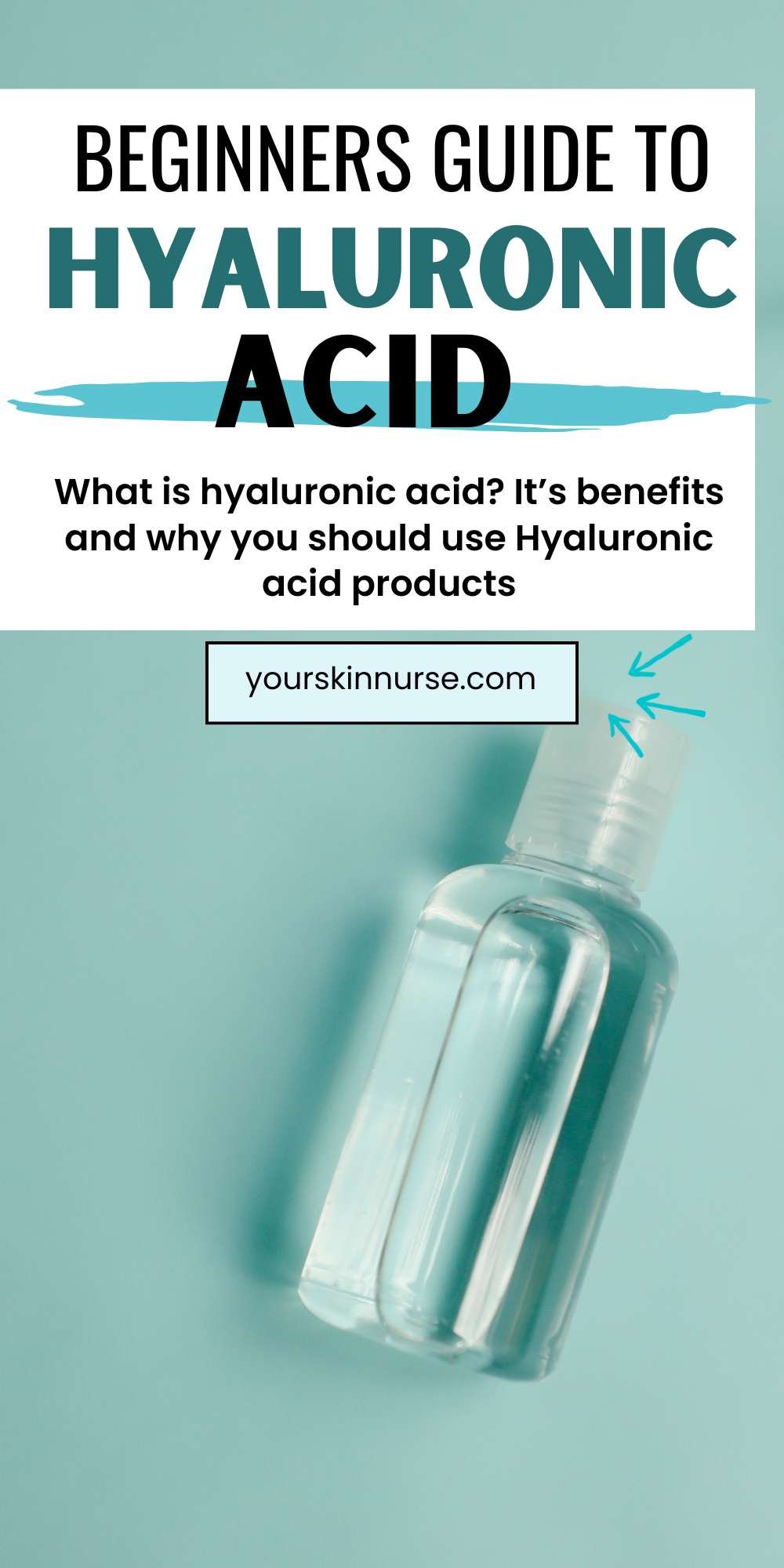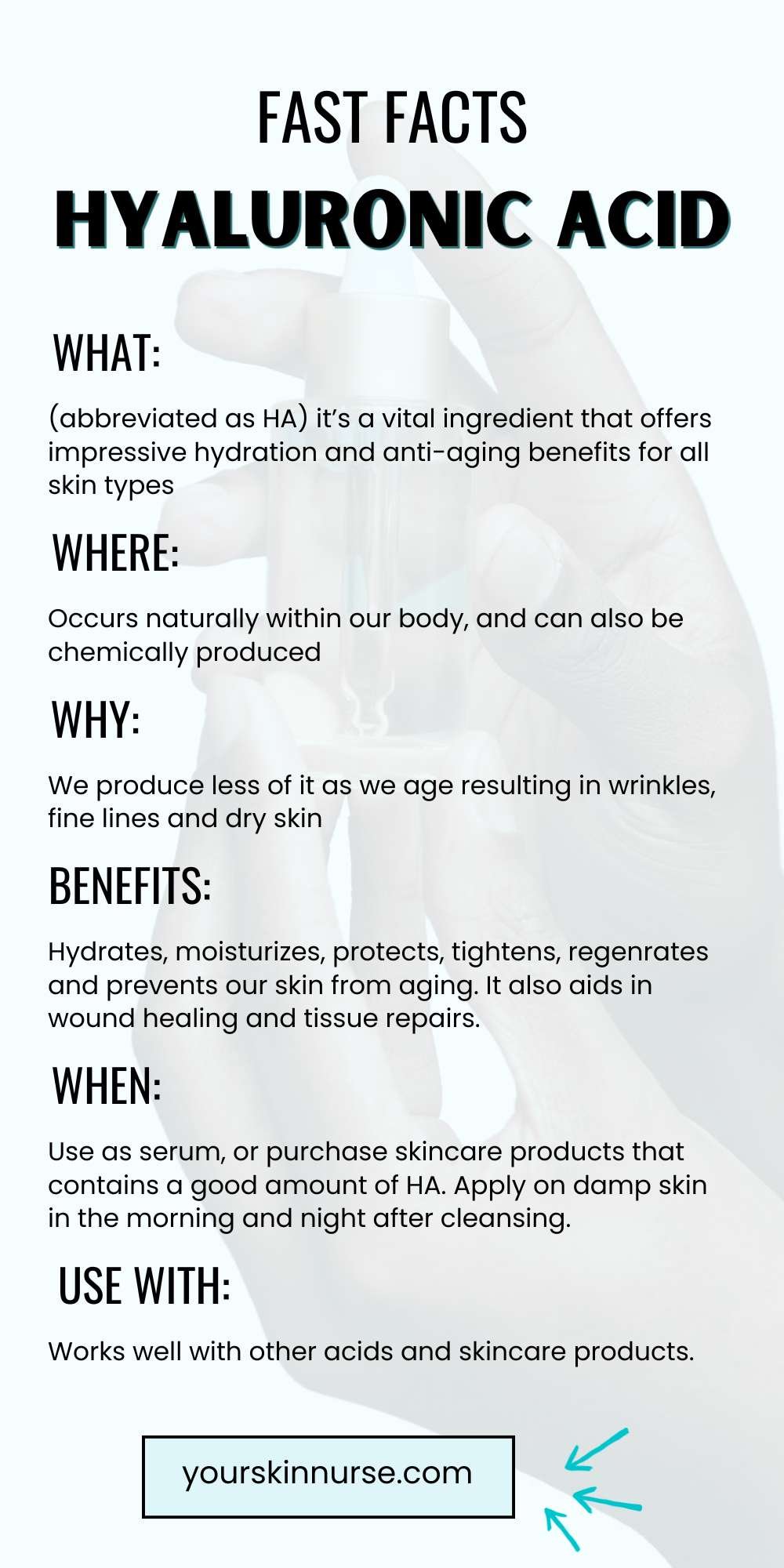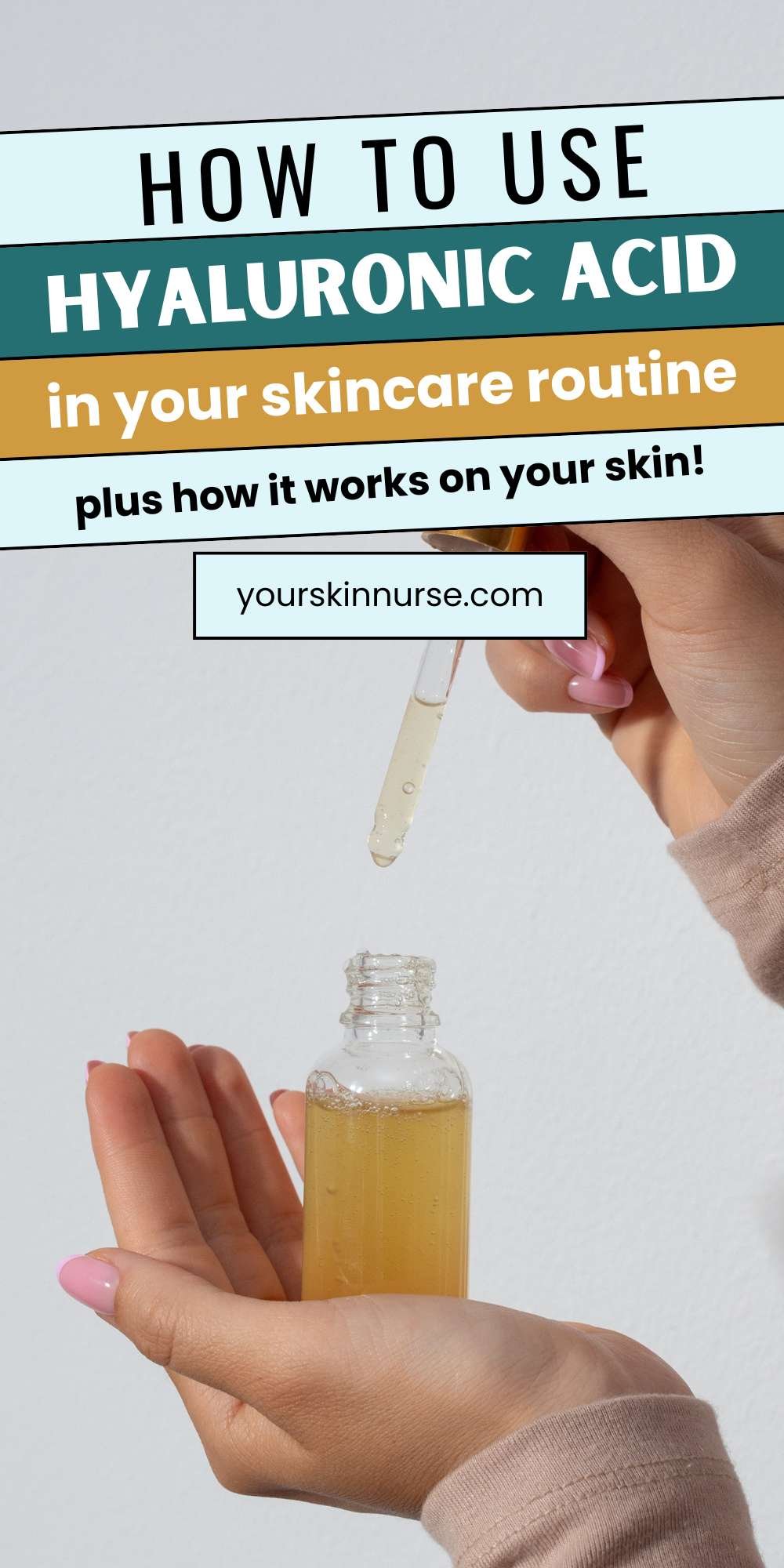Hyaluronic Acid: is it just a skincare trend or a must-have for healthy, hydrated skin? Known for its incredible ability to retain moisture, hyaluronic acid has become a skincare staple recommended by dermatologists worldwide. In fact, this molecule can hold up to 1,000 times its weight in water!
This molecule’s hydrating and plumping power makes it ideal for a range of skin types and concerns, from dryness to fine lines. As a skin nurse and dermatologist, I’ve witnessed firsthand how incorporating this ingredient can transform skin texture and hydration levels.
Ever picked up a skincare product, glanced at the ingredients list, and spotted “hyaluronic acid” but had no clue what it does? Don’t worry, you’re not alone. This guide covers everything from what makes hyaluronic acid so effective, how to use it, common mistakes to avoid and and why it’s loved by dermatologists and skincare enthusiasts alike.
DISCLAIMER
The information provided in this blog post is for educational purposes only and should not replace professional medical advice. Consult with a healthcare provider or dermatologist for personalized skincare recommendations. Please Read Our Disclaimer for more!
What is Hyaluronic Acid?
Hyaluronic acid (HA) is a naturally occurring substance found in our bodies, primarily in the skin, eyes, and connective tissues. It plays a crucial role in maintaining skin hydration, elasticity, and overall health.
HA isn’t just something you apply on your face; it’s already in your body. It naturally occurs in your skin, eyes, and joints, where its main job is to keep everything nice and moisturized. But, as you age, your body starts to produce less of this moisture-preserver. Add that to exposure to things like UV rays or harsh skincare products, and your HA levels can start to drop, leading to drier skin, fine lines, and wrinkles. And that’s where your trusty skincare products come in.
- Origins: HA was first discovered in 1934, first used in skincare in 2003, and since then, it has become a staple in dermatology and cosmetic formulations.
- Function: In the skin, hyaluronic acid helps retain moisture, creating a plump, youthful appearance. As we age, our natural levels of HA decrease, leading to dryness and loss of volume.
- Scientific Properties: HA is a glycosaminoglycan, a type of molecule that can attract and bind water, making it a powerhouse for hydration.
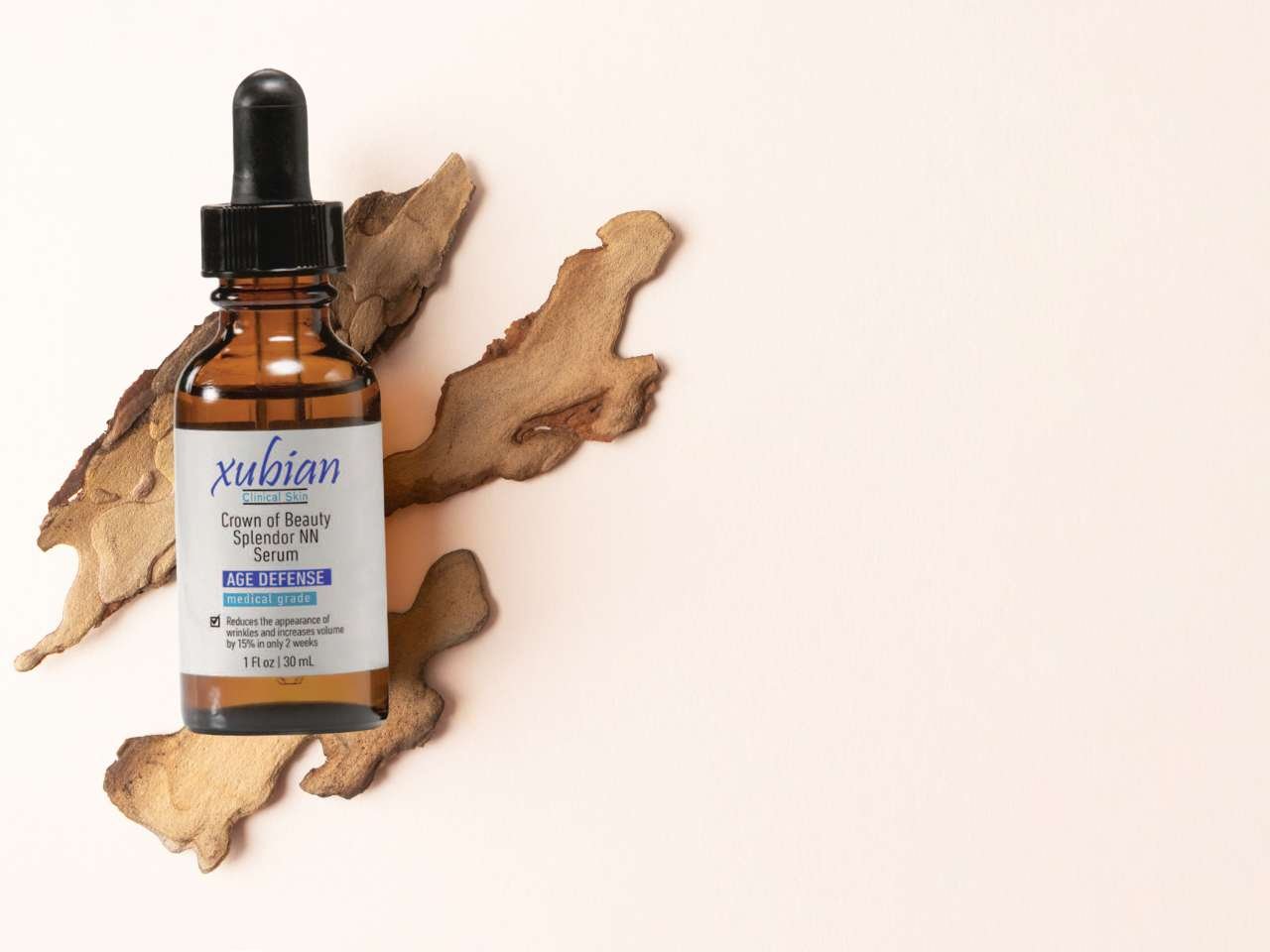
Hyaluronic Acid Benefits for Skin
Here are a few Hyaluronic acid benefits for your skin:
- Intense Hydration:
One of the best things about HA is its ability to provide serious moisture. It’s like a moisture magnet, pulling in water from the environment and locking it into your skin. It boosts moisture levels, making it ideal for all skin types, especially dry or dehydrated skin. If you deal with dry patches or flaky skin or have a dry skin type, adding hyaluronic acid can make a lot of difference.
- Skin Plumping and Anti-Aging:
Regular use reduces the appearance of fine lines and wrinkles. HA deeply hydrates the skin, filling in fine lines and giving an instantly plumper, smoother appearance. This extra moisture makes the skin look firmer and more youthful, with a “bounce-back” quality that naturally fades with age.
Over time, HA’s hydration support also helps slow visible aging. By enhancing skin elasticity and maintaining moisture levels, HA reduces the depth of wrinkles, making it a favorite for both immediate and long-term anti-aging results. Hyaluronic acid also encourages collagen production, which is important for keeping that youthful glow.
- Supports Skin Healing:
Hyaluronic acid aids in wound healing and reduces inflammation, making it suitable for sensitive or irritated skin. It’s commonly used in medical settings to help heal surgical wounds and even burns. In our everyday skincare routines, it can help speed up recovery from blemishes or skin damage. If you’re someone who struggles with acne, incorporating HA might be helpful. It keeps your skin hydrated while it’s healing, which is important.
- Soothes Dry and Sensitive Skin: Its gentle nature makes it perfect for even the most reactive and sensitive skin types. It has anti-inflammatory properties that can calm irritated skin and reduce redness.
- Compatibility: It works well with other skincare ingredients, such as retinoids and vitamin C, enhancing their effects.
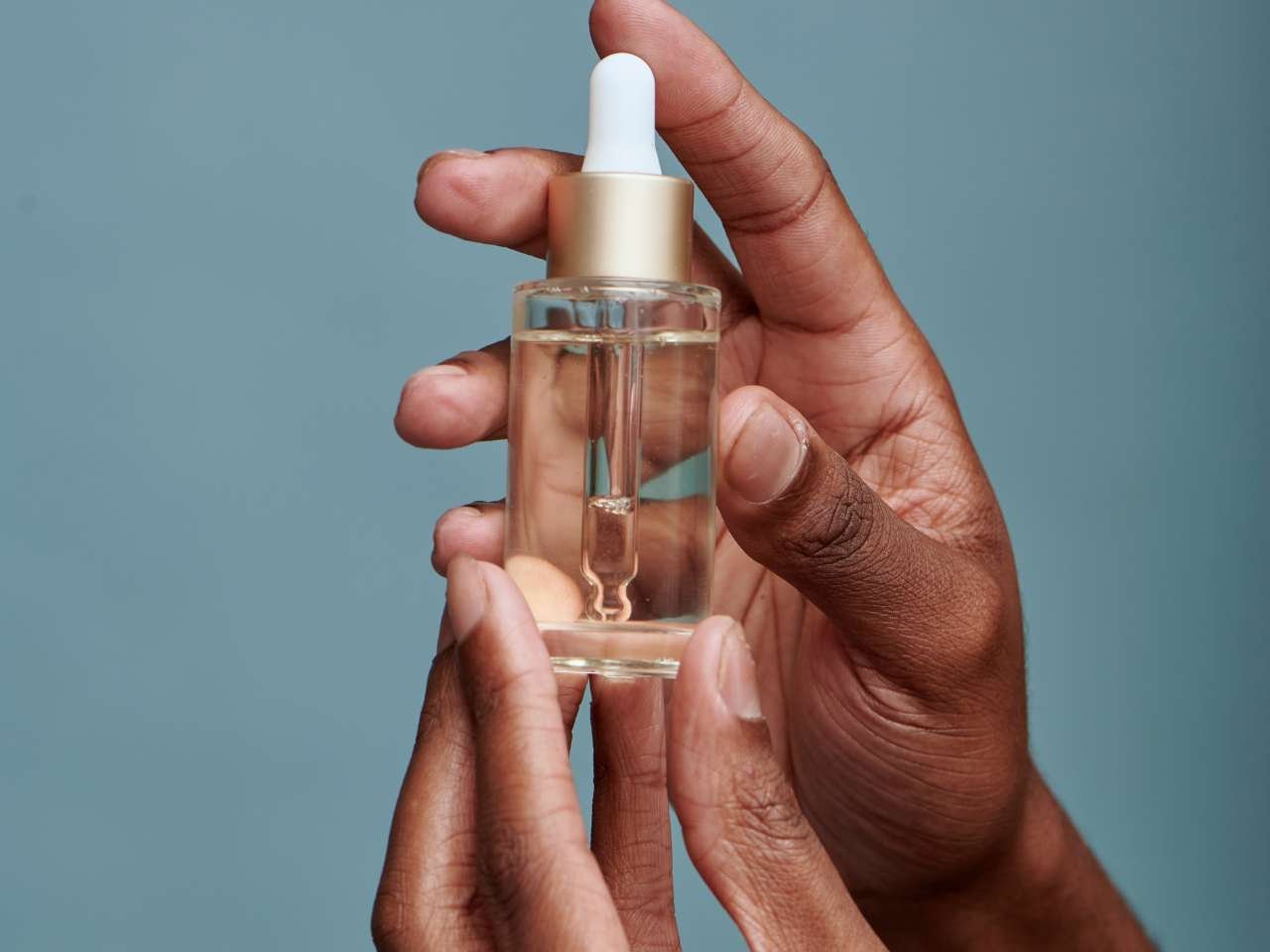
- Hyaluronic acid hydrates, plumps skin, and supports healing.
- It’s gentle enough for all skin types.
- Always apply on damp skin for maximum hydration.
How Hyaluronic Acid Works in the Skin
Hyaluronic acid is a natural humectant, which means it attracts and holds onto water molecules, helping the skin stay hydrated, plump, and resilient. But hyaluronic acid doesn’t just sit on the skin’s surface—it can work in multiple layers, depending on the molecular weight of the acid in your product. Here’s a closer look at how hyaluronic acid work its magic
- Hydration Mechanism: When applied topically, hyaluronic acid forms a thin, invisible barrier on the skin that traps moisture, preventing it from evaporating. This process is particularly effective in serums and moisturizers that contain both high and low-molecular-weight hyaluronic acid. And is beneficial for those with dry or dehydrated skin.
- Molecular Weights: Different forms of HA exist, with varying molecular weights. High-molecular-weight HA sits on the skin’s surface, providing a protective barrier, while low-molecular-weight HA penetrates deeper layers for lasting hydration.
- Enhancing the Skin’s Natural Moisture Barrier: The skin has its own protective barrier that keeps out environmental pollutants, bacteria, and toxins. Hyaluronic acid not only helps maintain this barrier but also enhances it. By keeping the skin hydrated, it prevents tiny cracks in the barrier that can lead to irritation, redness, and moisture loss. By replenishing hyaluronic acid levels with skincare, you can help the skin stay resilient and better equipped to handle stressors such as UV exposure, seasonal changes, and pollution.
- Supporting Collagen and Skin Elasticity: While hyaluronic acid doesn’t directly stimulate collagen production, it creates an environment where collagen thrives. Hydrated skin is a better environment for collagen, which is responsible for the skin’s firmness and elasticity. By keeping the skin deeply hydrated, hyaluronic acid indirectly supports a more youthful, firm complexion. It also helps reduce the visibility of fine lines and wrinkles, as plumper skin appears smoother.
- Promoting Healing and Reducing Inflammation: When the skin is damaged—whether from sun exposure, acne, or even minor cuts—hyaluronic acid helps promote healing by creating a protective, hydrating barrier. It reduces inflammation, soothes irritation, and speeds up recovery, making it a great ingredient for sensitive skin or for post-procedure recovery.

Types of Hyaluronic Acid and Their Benefits
Not all hyaluronic acids are created equal! Understanding the differences can help you choose the right product:
- High-Molecular Weight: Forms a moisture-locking layer on the skin surface, perfect for immediate hydration.
- Low-Molecular Weight: Penetrates deeper into the skin, providing lasting hydration and improved elasticity.
- Hydrolyzed Hyaluronic Acid: Smaller molecules for better absorption; great for serums!
- Sodium Hyaluronate: A common, stable form that’s often found in skincare products, ensuring optimal hydration.
Common Uses of Hyaluronic Acid in Skincare
Hyaluronic acid is found in various skincare products:
- Serums: These are the most concentrated forms, designed to be applied directly to the skin for maximum hydration. Check out some of our Hyaluronic acid serums below and be sure to add them to cart.
- Moisturizers: Often formulated with HA, these products help seal in moisture and provide long-lasting hydration. Shop our hyaluronic acid moisturizer below..
- Sheet Masks: A quick and effective way to deliver concentrated hydration.
- Injectables: HA fillers, such as Juvéderm and Restylane, are popular for adding volume and reducing wrinkles.
How to Use Hyaluronic Acid in Your Skincare Routine
To get the most out of hyaluronic acid, here’s how to incorporate it into your daily regimen:
- Choose the Right Product: Select a serum or moisturizer that suits your skin type.
- Cleanse: Start with a gentle cleanser to remove impurities.
- Tone: Use a hydrating toner to prep your skin and enhance absorption.
- Apply Hyaluronic Acid: On damp skin, apply a few drops of hyaluronic acid serum or moisturizer.
- Seal in Moisture: Follow with a moisturizer to lock in hydration.
- Sunscreen: In the morning, don’t forget to finish with sunscreen!
- Avoid Overusing: Too much HA can lead to dryness if not paired with sufficient moisture, as it may draw water from deeper layers of skin.
- Apply on damp skin after cleansing and toning.
- Always follow up with a moisturizer and sunscreen.
- Consistency is key for optimal results!
Hyaluronic Acid vs. Other Acids
Understanding how hyaluronic acid compares to other popular acids can help you choose the right one for your needs:
- Hyaluronic Acid vs. Glycolic Acid: Glycolic acid exfoliates and promotes cell turnover, while Hyaluronic acid hydrates. They can work together to achieve smoother, more radiant skin.
- Hyaluronic Acid vs. Salicylic Acid: Salicylic acid targets acne and oily skin by unclogging pores, whereas Hyaluronic acid focuses on hydration. They can be effectively combined in a skincare routine.
- Hyaluronic Acid vs. Lactic Acid: Lactic acid exfoliates and hydrates, providing a gentle option for those with sensitive skin. HA can complement lactic acid by enhancing hydration levels post-exfoliation.
Hyaluronic Acid Myths
There are several myths surrounding hyaluronic acid that can lead to confusion:
Myth 1: It is Only for Dry Skin.
Fact: One of the biggest hyaluronic acid myth is that it only beneficial for dry skin. This couldn’t be further from the truth! Hyaluronic acid works wonders for all skin types. Whether you have oily, combination, or sensitive skin, it helps balance your skin’s natural moisture levels, giving you that hydrated, healthy glow without adding extra oil.
Myth 2: You Can’t Use It with Other Acids.
Fact: HA works well alongside other acids, like glycolic or salicylic acid, enhancing their effects without irritation.
Myth 3: HA Clogs Pores
Fact: Nope! Hyaluronic acid is non-comedogenic, which means it won’t clog your pores. It’s super lightweight and non-occlusive, making it a great choice even for acne-prone skin. Instead of causing breakouts, it helps soothe and hydrate without adding any weight to your skin.
Myth 4: HA is Ineffective in Humid Climates
Fact: Another myth is that hyaluronic acid doesn’t work in humid conditions. But guess what? HA can still pull moisture from the air, so it’s effective even in high humidity. If you live in a humid area, this means you can keep your skin hydrated without feeling like you’re wearing a heavy moisturizer.
Myth 5: HA is Only for Anti-Aging.
Fact: While it’s popular for its anti-aging properties, it offers so much more! It reduces fine lines, soothes skin irritation, and improves skin elasticity, texture, and tone. HA is also beneficial for anyone looking to boost hydration. It’s a popular ingredient for a wide range of skincare products, not just anti-aging.
Myth 6: Natural Hyaluronic Acid is Better Than Synthetic Hyaluronic Acid
Fact: Here’s the truth: both natural and synthetic hyaluronic acid offer the same benefits. Their molecular structures are identical, which means they both work equally well to hydrate and nourish your skin.

Conclusion
Hyaluronic acid is more than just a buzzword in skincare; it’s a vital ingredient that offers impressive hydration and anti-aging benefits for all skin types. From serums to injectables, incorporating HA into your skincare routine can help you achieve a plump, youthful glow. Whether you’re new to skincare or a seasoned enthusiast, don’t overlook the power of hyaluronic acid in maintaining your skin’s health and vitality.
Ready to enhance your skincare routine with hyaluronic acid? Start by selecting the right product for your skin type and experience the transformative effects for yourself! Remember, healthy skin is beautiful skin!
Protect Your Skin and Age Beautifully.
There is no alternative to taking good care of your skin. If you have questions and concerns about your skin, or if you would like some help with acne, hyperpigmentation, skin tags and other skin concerns that may impact your appearance, or need help with your skincare routine or skincare products that will help nourish your skin in fall, we’re here for you. Learn more about our personalised skincare solutions for people of color. Contact us today to get started.
Share this on Pinterest!
